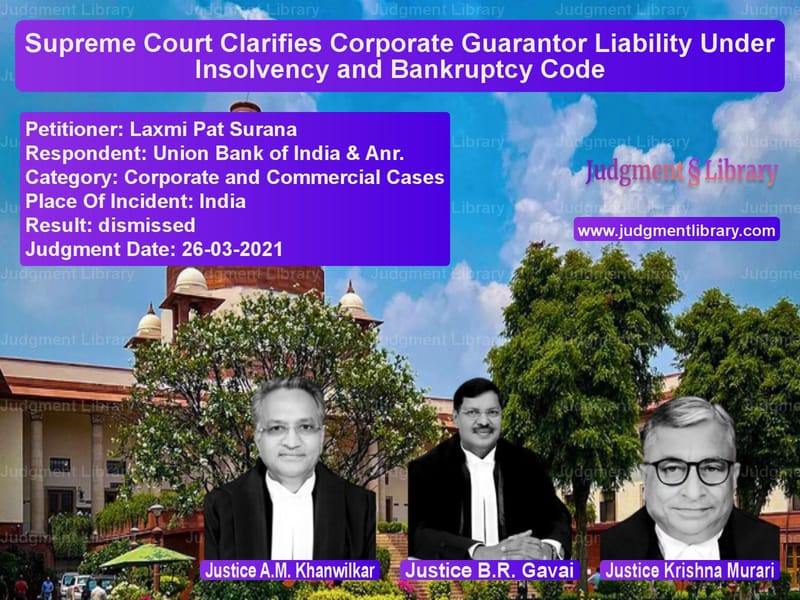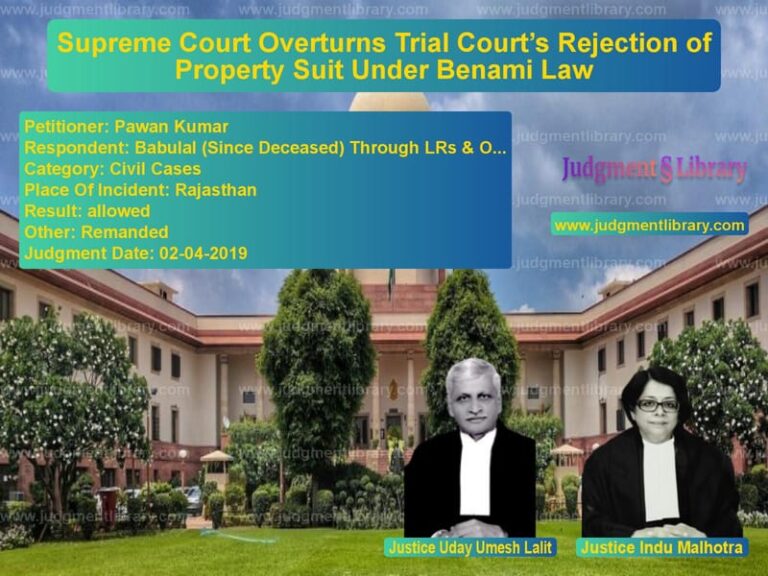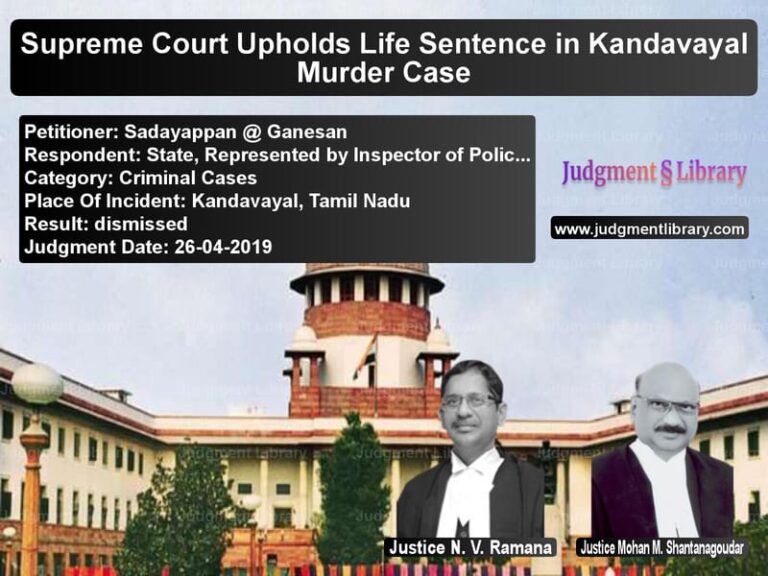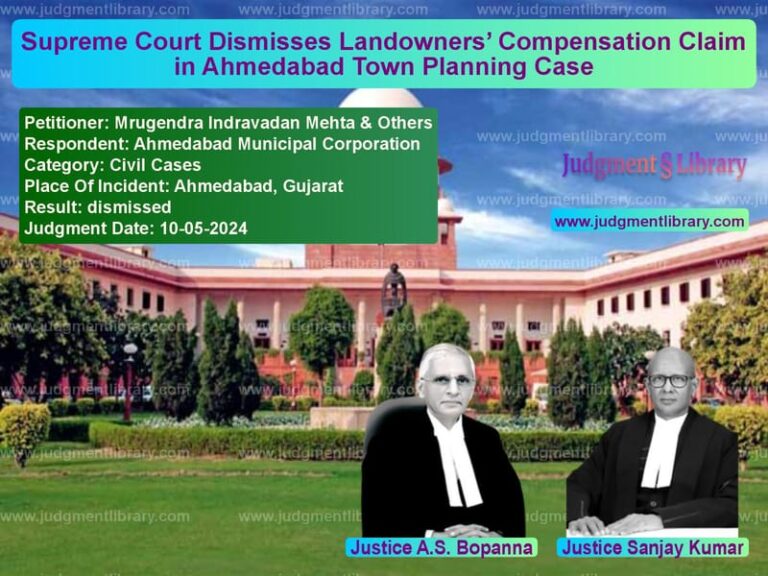Supreme Court Clarifies Corporate Guarantor Liability Under Insolvency and Bankruptcy Code
The Supreme Court of India recently delivered a significant judgment in the case of Laxmi Pat Surana v. Union Bank of India & Anr., addressing the scope of liability for corporate guarantors under the Insolvency and Bankruptcy Code, 2016 (IBC). The case primarily revolved around whether a corporate entity that has offered a guarantee for a loan can be proceeded against under Section 7 of the IBC, even if the principal borrower is not a corporate person. Additionally, the Court examined the applicability of the Limitation Act to proceedings under the IBC.
Background of the Case
The case involved M/s. Mahaveer Construction, a proprietary firm that had availed credit facilities from Union Bank of India. The appellant, Laxmi Pat Surana, was both the proprietor of Mahaveer Construction and a director in Surana Metals Limited, which had provided a corporate guarantee for the loan.
The financial creditor (Union Bank of India) declared the loan account as a Non-Performing Asset (NPA) on January 30, 2010, and issued a recall notice on February 19, 2010. Despite assurances, the borrower failed to repay the loan. The bank subsequently initiated proceedings before the Debt Recovery Tribunal (DRT) and later filed an application under Section 7 of the IBC against the corporate guarantor, Surana Metals Limited, on February 13, 2019.
Key Issues Before the Court
The Supreme Court examined two key issues:
- Whether an application under Section 7 of the IBC can be initiated against a corporate guarantor when the principal borrower is not a corporate entity.
- Whether an application under Section 7, filed beyond three years from the date of default, is barred by limitation.
Petitioner’s Arguments
The petitioner, Laxmi Pat Surana, argued:
- That Section 7 of the IBC applies only to defaults by corporate persons. Since the principal borrower, Mahaveer Construction, was a proprietary firm, no insolvency proceedings could be initiated against the corporate guarantor.
- That the limitation period for initiating insolvency proceedings had expired, as the default occurred on January 30, 2010, while the application under Section 7 was filed in February 2019.
Respondent’s Arguments
The financial creditor (Union Bank of India) contended:
- The liability of the corporate guarantor is coextensive with that of the principal borrower under Section 128 of the Indian Contract Act, 1872.
- As per Section 7 of the IBC, an application can be filed against the corporate guarantor even if the principal borrower is not a corporate entity.
- Repeated acknowledgments of debt by the borrower and the guarantor extended the limitation period, making the application under Section 7 timely.
Supreme Court’s Observations and Verdict
The Supreme Court, led by A.M. Khanwilkar, B.R. Gavai, and Krishna Murari, made the following key observations:
1. Applicability of Section 7 of the IBC to Corporate Guarantors
“A corporate person who has offered a guarantee for a loan will fall within the definition of ‘corporate debtor’ under the IBC. This means that insolvency proceedings can be initiated against the corporate guarantor even if the principal borrower is not a corporate entity.”
The Court emphasized that the liability of the guarantor is coextensive with that of the principal borrower. It noted that allowing corporate guarantors to escape insolvency proceedings merely because the principal borrower is not a corporate entity would defeat the purpose of the IBC.
2. Limitation Period for Filing an Application Under Section 7
“Acknowledgment of debt within the limitation period extends the time for filing an application under Section 7 of the IBC. A fresh period of limitation is computed from the date of acknowledgment.”
The Court observed that the financial creditor had placed on record multiple acknowledgments of debt by the borrower and the corporate guarantor, with the latest acknowledgment dated December 8, 2018. Since the application under Section 7 was filed in February 2019, it was held to be within the limitation period.
Conclusion
The Supreme Court’s ruling in this case provides clarity on two significant aspects of insolvency law:
- Corporate guarantors can be proceeded against under Section 7 of the IBC even if the principal borrower is not a corporate entity.
- Repeated acknowledgments of debt can extend the limitation period for initiating insolvency proceedings.
This judgment reinforces the principle that financial creditors have the right to initiate corporate insolvency resolution proceedings against guarantors to recover outstanding dues, thereby strengthening creditor rights under the IBC.
Petitioner Name: Laxmi Pat Surana.Respondent Name: Union Bank of India & Anr..Judgment By: Justice A.M. Khanwilkar, Justice B.R. Gavai, Justice Krishna Murari.Place Of Incident: India.Judgment Date: 26-03-2021.
Don’t miss out on the full details! Download the complete judgment in PDF format below and gain valuable insights instantly!
Download Judgment: laxmi-pat-surana-vs-union-bank-of-india-supreme-court-of-india-judgment-dated-26-03-2021.pdf
Directly Download Judgment: Directly download this Judgment
See all petitions in Bankruptcy and Insolvency
See all petitions in Corporate Compliance
See all petitions in unfair trade practices
See all petitions in Judgment by A M Khanwilkar
See all petitions in Judgment by B R Gavai
See all petitions in Judgment by Krishna Murari
See all petitions in dismissed
See all petitions in supreme court of India judgments March 2021
See all petitions in 2021 judgments
See all posts in Corporate and Commercial Cases Category
See all allowed petitions in Corporate and Commercial Cases Category
See all Dismissed petitions in Corporate and Commercial Cases Category
See all partially allowed petitions in Corporate and Commercial Cases Category







